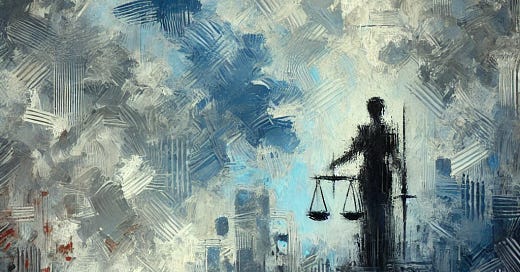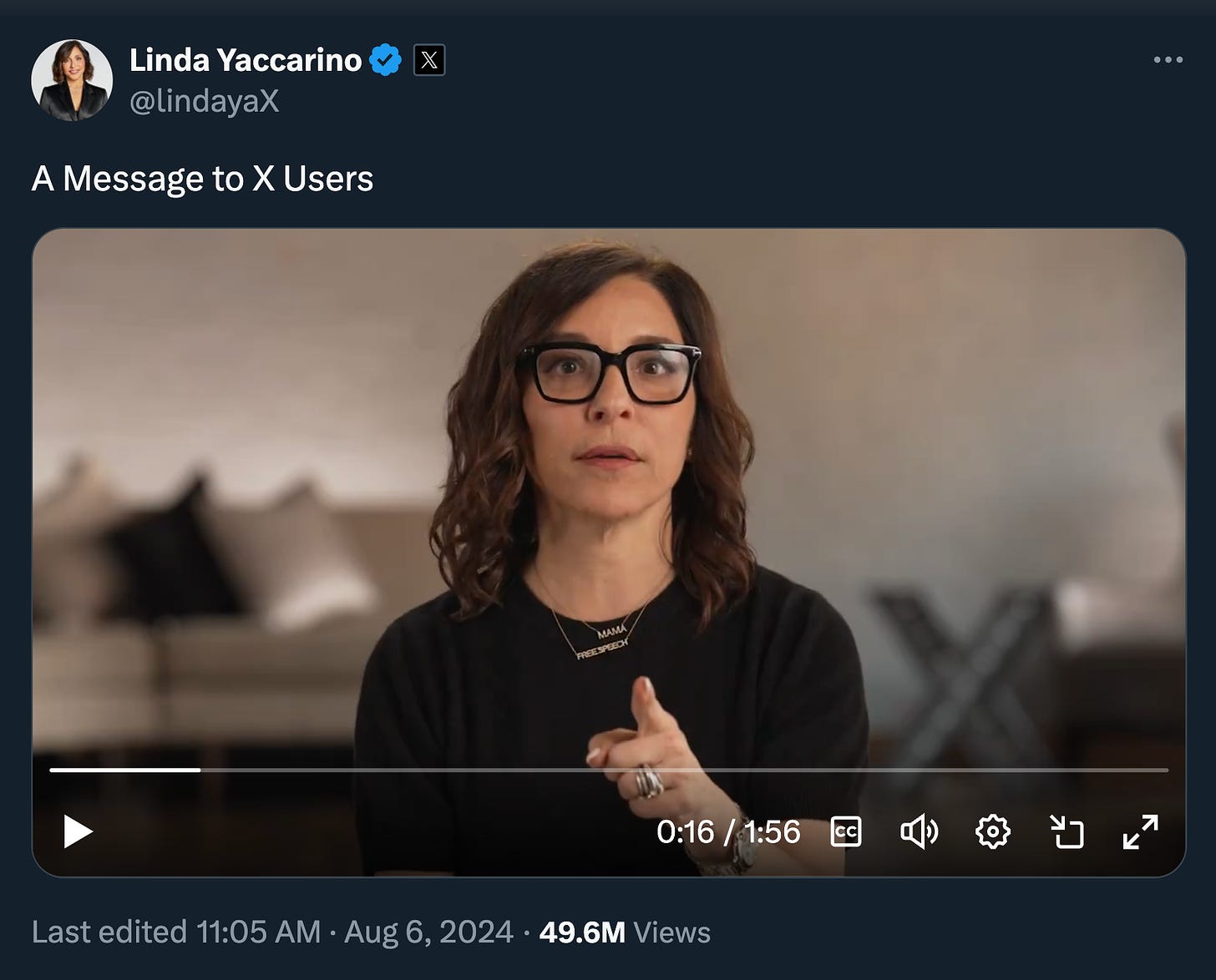Welcome back to the Ethical Reckoner. In this Weekly Reckoning, we cover a few court cases, including Google’s massive antitrust loss and Elon Musk’s battery of lawsuits against advertisers and OpenAI. Then, OpenAI itself is getting criticism for not releasing a text watermarking tool, and Russia has been pulling flak for stoking cyber discord agains the Olympics. Then, a brief discussion of how antitrust may mean fewer tech billionaires, and what that means for US politics.
This edition of the WR is brought to you by… the sound of rain on a roof in coastal New England.
The Reckonnaisance
Google is a monopolist, rules US court
Nutshell: Google mostly lost its first big antitrust case, with a judge ruling that it is has an illegal monopoly on online search and most search advertising.
More: Some of the issues at play were Google’s payments to browsers and phone manufacturers to make Google the default search engine (including $20 billion and 36% of Safari search revenue to Apple). Google claimed that it’s the dominant engine because it’s the best, but the ruling accepts the government’s argument that it’s the best because of how it worked to entrench its market dominance. This is the DOJ’s first major antitrust victory in a while, and comes as Amazon, Apple, and Meta all face antitrust lawsuits of their own. Google also has a second trial in the fall about its ad tech business. These cases are part of a major tech antitrust push from the FTC and DOJ that began during the Trump administration, has continued into the Biden administration, but is something of a question mark in the election this year.
Why you should care: The remedy hasn’t been decided (that phase should begin in September) but stay tuned, because it might actually have an impact on your life. On the most extreme end, Google could be forced to sell off Chrome or other parts of its business, which would change how we all interact with its products. A more likely outcome is that Google won’t be able to pay to be the default search engine anymore. Google is terrified of losing its default search engine status to someone else—estimating it would lose 60-80% of searches—but if Google isn’t allowed to pay, likely no one else will be either, and users will be prompted to select a default. In that case, Google may actually come out ahead because it wouldn’t be shelling out billions, and realistically most people will pick Google anyway—in which case not much will change.
OpenAI doesn’t want to release generated text watermarks
Nutshell: OpenAI has a tool for detecting text generated by ChatGPT, but doesn’t want to release it in part for commercial reasons.
More: The WSJ reported that OpenAI has developed a system for watermarking ChatGPT-generated text, meaning that it can tell when text has been generated via ChatGPT (like the tools they’ve announced for images and video). People worldwide support having AI detection tools by a 4:1 margin, but it’s been internally debated because of concerns like “stigmatizing” ChatGPT use—plus probably a survey showing that 30% of ChatGPT users would be less likely to use it “if it deployed watermarks and a rival didn’t.” Additionally, while it’s resilient against “localized tampering” like paraphrasing and changing words, it’s vulnerable to “globalized tampering” like translating or rewording with another model.
Why you should care: If you’re one of the 80% of people who support AI detection tools, then this might interest you. OpenAI’s arguments can be broken down into two categories: ethics/culture and commercial. One of their ethics concerns is that it would “stigmatize use of AI as a useful writing tool for non-native English speakers,” and there is something to that, but I’d argue that it’s no worse than existing suspicions when someone has used ChatGPT to write an email, and that it might increase our understanding of the legitimate and helpful applications of AI. The commercial concern is a sort of prisoner’s dilemma situation—if only OpenAI launches watermarking, they’ll be at a disadvantage, so theoretically it would be best if everyone launched text watermarking at the same time. Theoretically, the top AI companies have all promised to do this in their voluntary AI safety commitments announced by the White House, but it seems like no one is in a rush to apply this to text.

Elon Musk continues filing lawsuits
Nutshell: X is suing an advertising coalition alleging a “conspiracy” to withhold advertising revenue, and Musk has revived his lawsuit against OpenAI.
More: The X lawsuit is against the World Federation of Advertisers (WFA), Unilever, Mars, CVS, and Ørsted, alleging they violated antitrust laws by conspiring to “withhold billions of dollars in advertising revenue” from Twitter. The WFA ran an initiative called the Global Alliance for Responsible Media (GARM), which helped advertisers keep their ads from appearing next to illegal and harmful content. I say “ran” because the WFA announced that GARM would be shutting down to fight the lawsuit.
Musk’s lawsuit is a revival of one we talked about in WR 19 that was withdrawn in June. Dubbed “hilariously bad” by commentators, it claimed that OpenAI had breached its founding agreement by not open-sourcing all its releases. This new lawsuit claims that OpenAI broke federal racketeering laws and that OpenAI’s co-founders “assiduously manipulated” Musk into funding the company. Choice quote: “The perfidy and deceit is [sic] of Shakespearean proportions.”
Why you should care: Unfortunately, Musk’s actions continue to impact the world, even when he’s behaving like a toddler not living up to his responsibilities as one of tech’s most influential people. This new lawsuit is richly ironic because X claims to be the free speech platform—CEO Linda Yaccarino was wearing a “FREE SPEECH” necklace in a slightly bizarre video announcing the lawsuit—and yet X is suing advertisers for exercising their freedom of speech by choosing to not being associated with X.
Lesson: there’s nothing that says “free speech” like forcibly compelled speech.
It’s probably not going to go anywhere, but it’s already shut down GARM (in other words: frivolous, but perhaps by design). This may be a Pyrrhic victory, though, because without GARM, advertisers will be even more reluctant to advertise on risky platforms—aka X. As for Elon’s lawsuit, well, regardless of its merits (racketeering charges seem… unlikely to stick here), if it carries forth to discovery, there will certainly be some popcorn moments.
Russia engages in online hijinks against Olympics
Nutshell: Russia operated a state-sponsored disinformation/propaganda campaign to denigrate the Olympics.
More: They’re leaning on generative AI to create mocking music videos (including one with the lovely lyric “Paris, Paris, 1-2-3, go to Seine and make a pee”), existing disinformation networks to amplify debates about gender, and state news outlets to put down the “decadent, rotting west.” It seems like there weren’t significant cyberattacks (as there have been in the past), but part of the motivation is probably because Russian and Belarusian athletes are competing under neutral flags (with a “nondescript, wordless tune” substituted for national anthems at medal ceremonies). Also, while it’s unknown who’s behind this, the Berkman-Klein Center detected an automated copyright complaint campaign trying to remove information related to a specific Russian athlete from the web.
Why you should care: While I enjoyed the Olympics as much as the next person, it’s easy to forget amongst the drama of competition that it’s an inherently political forum, and with that comes geopolitical competition. And while there haven’t been major disruptive incidents, they have successfully fueled a lot of toxic online discourse, particularly targeting the boxer Imane Khelif. This sort of stuff can appear organic, but sometimes it’s a bit… comforting, I suppose, to think that it’s not as a big bunch of people being hateful as it seems (except JK Rowling), “just” a big government.
Extra Reckoning
Much has been written about how antitrust might impact the Big Tech landscape going forward. After writing this week’s items about Musk’s lawsuits and Google’s antitrust lost, it got me thinking that antitrust could also impact the landscape of Big Tech billionaires, notably by producing fewer of them. If US and EU antitrust continues to the point where tech companies are broken up or voluntarily spin off parts of their business, companies will be smaller, individual company revenues will be lower, and CEO compensation might also be less—but there will be more companies and thus more CEOs. As a result, you might end up with fewer tech billionaires and more tech millionaires. And fewer tech billionaires might mean less individual influence over politics, which is an interesting thought considering how much noise individuals like Musk generate when it’s reported that he’s contributing $45 million a month to a Trump-aligned super PAC (which he disputes) or that LinkedIn co-founder Reid Hoffman is joining a group in support of Harris. Money talks in politics—especially highly concentrated money—and so while a post-aggressive-antitrust Silicon Valley would still hold a lot of sway over US politics, it may be less subject to the whims of particular rich tech bros.
The only people who may have more sway than Silicon Valley brass? Beyoncé and Taylor Swift.
I Reckon…
that the “slow food” of social media might be the next big (little) thing. (It’s already got half of Vermonters!)
Thumbnail generated by DALL-E 3 via ChatGPT with a variation on the prompt “Please generate an abstract, brushy, Impressionist-style painting representing the concept of a lawsuit.”






